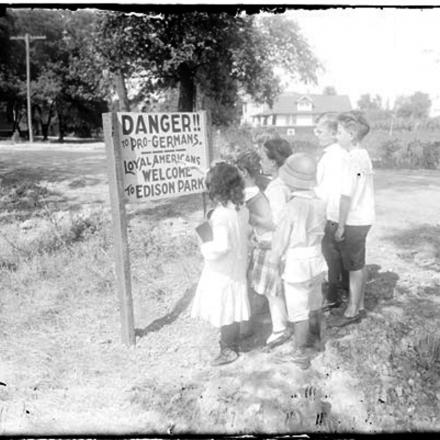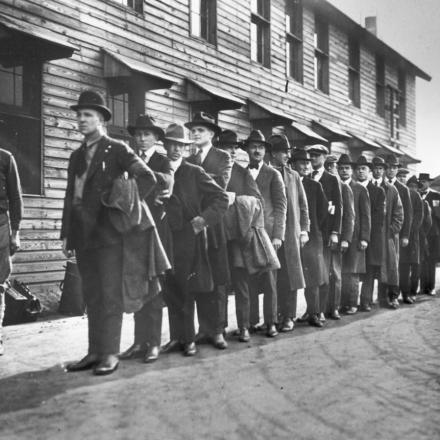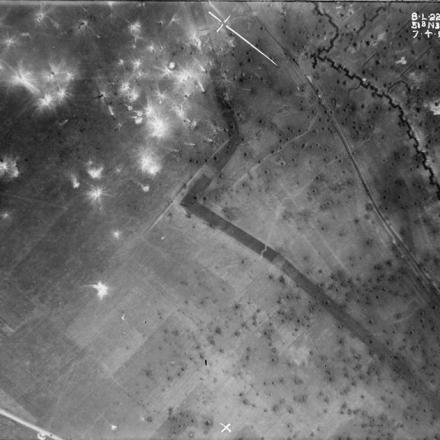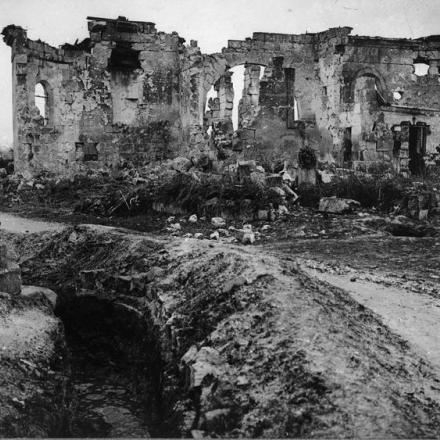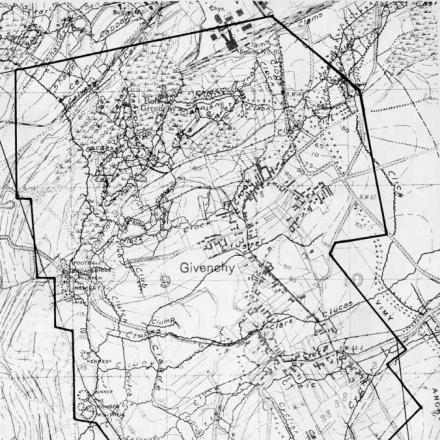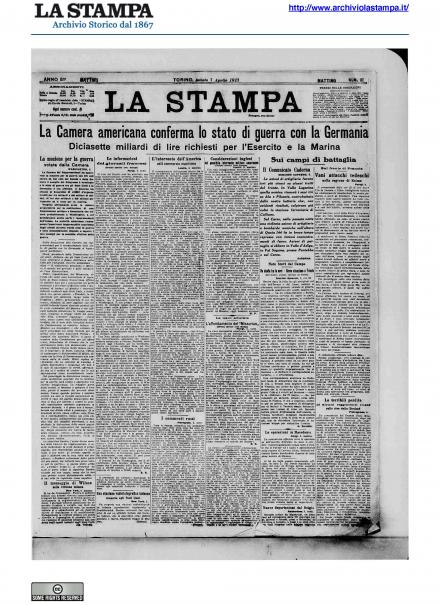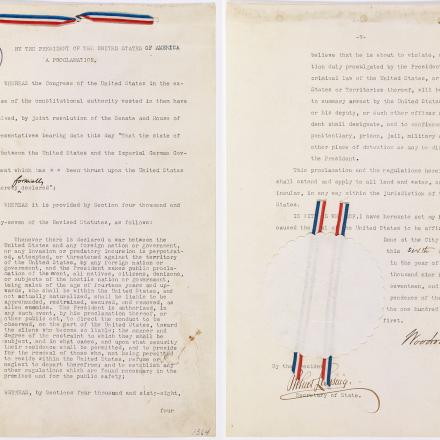Il Kaiser in contropiede
«La falsa democrazia americana non è degna di dare lezioni al popolo tedesco. […] Gli Stati Uniti lottano per i loro dollari, noi per la nostra esistenza e il nostro onore». A prescindere dalla fede politica, i giornali di tutta la Germania fanno quadrato attorno al Governo e al Kaiser. «Il popolo tedesco è devotissimo agli ordinamenti statali esistenti, ama e ammira il suo Imperatore. Gli americani non comprendono le condizioni dell’Europa e giudicano la Germania con criteri parziali. […] Il tentativo di provocare discordie tra il popolo tedesco e il Governo è inutile».
Il 7 aprile il Presidente Wilson annuncia lo stato di guerra pubblicando un proclama. Le prime disposizioni implicano restrizioni alla libertà dei cittadini di origine tedesca non naturalizzati, per dirla in altri termini "i plausibili nemici interni”. Non sono ordinati né il confino in campi di concentramento, né l’espulsione, ma se ne ammette la possibilità. In sostanza: “comportatevi bene e nessuno si farà male”. Scontati il massiccio stanziamento di fondi, la mobilitazione della marina e la chiamata al reclutamento.
Washington chiama, Berlino risponde. Anche il Kaiser pubblica un manifesto e non credo sia una coincidenza fortuita. Guglielmo II promette riforme costituzionali in Prussia e incarica il Cancelliere Bethmann-Hollweg di occuparsi dei preparativi: «Sono deciso ad attuare il riassetto politico, economico e sociale. […] Non vi è più spazio in Prussia per un diritto elettorale classista, non dopo il formidabile impegno di tutto il popolo in questa spaventosa guerra». Le riforme non saranno immediate: perché un cambio epocale va studiato bene, perché andranno coinvolti anche tutti gli uomini al fronte e perché, in una fase cruciale del conflitto, le istituzioni hanno altri grattacapi. Ma firmata la pace saranno il primo passo da fare. L’annuncio non serve solo a rinsaldare l’unità nazionale e a stemperare un possibile eco della rivoluzione russa, Berlino vorrebbe anche impressionare l’estero, o almeno mitigarne le diffidenze: “Ci accusate di dispotismo? Bene, eccovi serviti”.
Intanto le prime conseguenze dell’intervento statunitense non si fanno attendere: Cuba dichiara guerra a Berlino e nel giro di poche ore verrà seguita da Panama; non qualcosa per cui perdere il sonno, ma comunque un fastidioso contrattempo per eventuali operazioni nei Caraibi.
Davide Sartori
GLI AVVENIMENTI
Politica e società
- Il Presidente Wilson pubblica il proclama dichiarante lo stato di guerra con la Germania.
- Il Re d'Italia telegrafa a Wilson le congratulazioni per l’intervento degli Stati Uniti nella guerra, dovuto ai medesimi ideali che hanno guidato l’Italia.
- Cuba dichiara guerra alla Germania.
- Il Kaiser Guglielmo II promette una riforma elettorale in Prussia.
Fronte occidentale
- I britannici avanzano a nord-ovest di Saint-Quentin, verso Fresnoy-le-Petit.
- Duri scontri attorno Berry-au-Bac (nord-ovest di Reims).
Dal fronte italiano
REGIO ESERCITO ITALIANO - COMANDO SUPREMO
BOLLETTINO DI GUERRA N. 681 - 07 APRILE 1917 - ORE 18:00
Lungo tutta la fronte azioni intermittenti delle artiglierie, ostacolate dal maltempo che imperversa nel teatro delle operazioni.
Nel pomeriggio del 5 il nemico fece brillare una grossa mina presso un nostro posto avanzato sulla seconda cima del Colbricon, senza peraltro causarci nè vittime nè danni.
Sul Carso la notte scorsa, a nord di Boscomalo, un nostro piccolo riparto in ricognizione occupò di sorpresa, affermandovisi, un posto avanzato del nemico, in parte uccidendone e in parte catturandone il presidio.
Generale CADORNA
Proclama del Presidente Wilson
Presidential Proclamation of April 6, 1917U.S. Executive Office of the President.
BY THE PRESIDENT OF THE UNITED STATES OF AMERICA
A PROCLAMATION
WHEREAS the Congress of the United States in the exercise of the constitutional authority vested in them have resolved, by joint resolution of the Senate and House of Representatives bearing date this day "That the state of war between the United States and the Imperial German Government which has * * been thrust upon the United States is hereby formally declared";
WHEREAS it is provided by Section four thousand and sixty-seven of the Revised Statutes, as follows:
Whenever there is declared a war between the United States and any foreign nation or government, or any invasion or predatory incursion is perpetrated, attempted, or threatened against the territory of the United States, by any foreign nation or government, and the President makes public proclamation of
the event, all natives, citizens, denizens, or subjects of the hostile nation or government, being males of the, age of fourteen years and upwards, who shall be within the United States, and not actually naturalized, shall be liable to be apprehended, restrained, secured, and removed, as alien enemies. The President is authorized, in any such event, by his proclamation thereof, or other public act, to direct the conduct to be observed, on the part of the United States, toward the aliens who become so liable; the manner and degree of the restraint to which they shall be subject, and in what cases, and upon what security their residence shell be permitted, and to provide for the removal of those who, not being permitted to reside within the United States, refuse or neglect to depart therefrom; and to establish any other regulations which are found necessary in the premises and for the public safety;
WHEREAS, by Sections four thousand and sixty-eight, four thousand and sixty-nine, and four thousand and seventy, of the Revised Statutes, further provision is made relative to alien enemies,
NOW, THEREFORE, I, Woodrow Wilson, President of the United States of America; do hereby proclaim to all whom it may concern that a state of war exists between the United States and the Imperial German Government; and I do specially direct all officers, civil or military, of the United States that they exercise vigilance and zeal in the discharge of the duties incident to such a state of war and I do, moreover, earnestly appeal to all American citizens that they, in loyal devotion to their country, dedicated from its foundation to the principles of liberty and justice, uphold the laws of the land, and give undivided and willing support to those measures which may be adopted by the constitutional authorities in prosecuting the war to a successful issue and in obtaining a secure and just peace;
And, acting under and by virtue of the authority vested in me by the Constitution of the United States and the said sections of the Revised Statutes, I do hereby further proclaim and direct that the conduct to be observed on the part of the United States towards all natives, citizens, denizens, or subjects of Germany, being males of the age of fourteen years and upwards, who shall be within the United States and not actually naturalized, who for the purpose of this proclamation and under such sections of the Revised Statutes are termed alien enemies, shall be as follows:
All alien enemies are enjoined to preserve the peace towards the United States and to refrain from crime against the public safety, and from violating the laws of the United States and of the States and Territories thereof, and to refrain from actual hostility or giving information, aid or comfort to the enemies of the United States, and to comply strictly with the regulations which are hereby or which may be from time to time promulgated by the President; and so long as they shall conduct themselves in accordance with law, they shall be undisturbed in the peaceful pursuit of their lives and occupations and be accorded the consideration due to all peaceful and law-abiding persons, except so far as restrictions may be necessary for their own protection and for the safety of the United States; and towards such alien enemies, as conduct themselves in accordance with law, all citizens of the United States are enjoined to preserve the peace and to treat them with all such friendliness as may be compatible with loyalty and allegiance to the United States.
And all alien enemies who fail to conduct themselves as so enjoined, in addition to all other penalties prescribed by law, shall be liable to restraint, or to give security, or to remove and depart from the United States in the manner prescribed by Sections four thousand and sixty-nine and four thousand and seventy of the Revised Statutes, and as, prescribed in the regulations duly promulgated by the President;
And pursuant to the authority vested in me, I hereby declare and establish the following regulations, which I find necessary in the premises and for the public. safety:
(1) An alien enemy shall not have in his possession, at any time or place, any fire-arm, weapon or implement of war, or component part thereof, ammunition, maxim or other silencer, bomb or explosive or material used in the manufacture of explosives;
(2) An alien enemy shall not have in his possession at any time or place, or use or operate any aircraft or wireless apparatus, or any form of signalling device, or any form of cipher code, or any paper, document or book written or printed in cipher or in which there may be invisible writing.
(3) All property found in the possession of an alien enemy in violation of the foregoing regulations shall be subject to seizure by the United States;
(4) An alien enemy shall not approach or be found within one-half of a mile of any Federal or State fort, camp, arsenal, aircraft station, Government or naval vessel, navy yard, factory, or workshop for the manufacture of munitions of war or of any products for the use of the Army or Navy;
(5) An alien enemy shall not write, print, or publish any attack or threats against the Government or Congress of the United States, or either branch thereof, or against the measures or policy of the United States, or against the person or property of any person in the military, naval, or civil service of the United States, or of the States or Territories, or of the District of Columbia, or of the municipal governments therein;
(6) An alien enemy shall not commit or abet any hostile act against the United States, or give information, aid, or comfort to its enemies;
(7) An alien enemy shall not reside in or continue to reside in, to remain in, or enter any locality which the President may from time to time designate by Executive Order as a prohibited area in which residence by an alien enemy shall be found by him to constitute a danger to the public peace and safety of the United States, except by permit from the President and except under such limitations or restrictions as the President may prescribe;
(8) An alien enemy whom the President shall have reasonable cause to believe to be aiding or about to aid the enemy, or to be at large to the danger of the public peace or safety of the United States, or to have violated or to be about to violate any of these regulations, shall remove to any location designated by the President by Executive Order, and shall not remove therefrom without a permit, or shall depart from the United States if so required by the President;
(9) No alien enemy shall depart from the United States until he shall have received such permit as the President shall prescribe, or except under order of a court, judge, or justice, under Sections 4069 and 4070 of the Revised Statutes;
(10) No alien enemy shall land in or enter the United States, except under such restrictions and at such places as the President may prescribe;
(11) If necessary to prevent violations of these regulations, all alien enemies will be obliged to register;
(12) An alien enemy whom there may be reasonable cause to believe to be aiding or about to aid the enemy, or who may be at large to the danger of the public peace or safety, or who violates or attempts to violate, or of whom there is reasonable ground to believe that he is about to violate, any regulation duly promulgated by the President, or any criminal law of the United States, or of the States or Territories thereof, will be subject to summary arrest by the United States Marshal, or his deputy, or such other officer as the President shall designate, and to confinement in such penitentiary, prison, jail, military camp, or other place of detention as may be directed by the President.
This proclamation and the regulations herein contained shall extend and apply to all land and water, continental or insular, in any way within the jurisdiction of the United States.
IN WITNESS WHEREOF, I have hereunto set my hand and caused the seal of the United States to be affixed.
Done at the City of Washington, this sixth day of April, in the year of our Lord one thousand nine hundred and seventeen, and of the independence of the United States the one hundred and forty-first.
WOODROW WILSON
By the President:
ROBERT LANSING.
Secretary of State.
L'entrata in guerra di Cuba e Panama
Cuban Declaration of War, 7 April 1917
Article I
Resolved, that from today a state of war is formally declared between the Republic of Cuba and the Imperial Government of Germany, and the President of the Republic is authorized and directed by this resolution to employ all the forces of the nation and the resources of our Government to make war against the Imperial German Government with the object of maintaining our rights, guarding our territory and providing for our security, prevent any acts which may be attempted against us, and defend the navigation of the seas, the liberty of commerce, and the rights of neutrals and international justice.
Article II
The President of the Republic is hereby authorized to use all the land and naval forces in the form he may deem necessary, using existing forces, reorganizing them or creating new ones, and to dispose of the economic forces of the nation in any way he may deem necessary.
Article III
The President will give account to Congress of the measures adopted in fulfilment of this law, which will be in operation from the moment of its publication in the Official Gazette.
President Mario Menocal's Statement on Cuba's Decision to Enter the War, 7 April 1917
Cuba cannot remain neutral in this supreme conflict, because the declaration of neutrality would oblige her to treat all belligerents equally, refusing them with equal rigour any access to her ports and imposing on them the same restrictions and prohibitions, which would be in the present case contrary to public sentiment, to the essence of the pacts and moral obligations, moral rather than legal, which bind us to the United States; and would result, lastly, because of our geographical location, in being the cause of innumerable conflicts, the consequences of which it is easy to predict for a friendly and allied nation, and which would prove an inexcusable weakness and condescension for the attitude of implacable aggression unconditionally proclaimed by the Imperial German Government against the rights of all neutral peoples and against the principles of humanity and justice, which constitute the highest note of modern civilisation.
Source: Source Records of the Great War, Vol. V, ed. Charles F. Horne, National Alumni 1923
